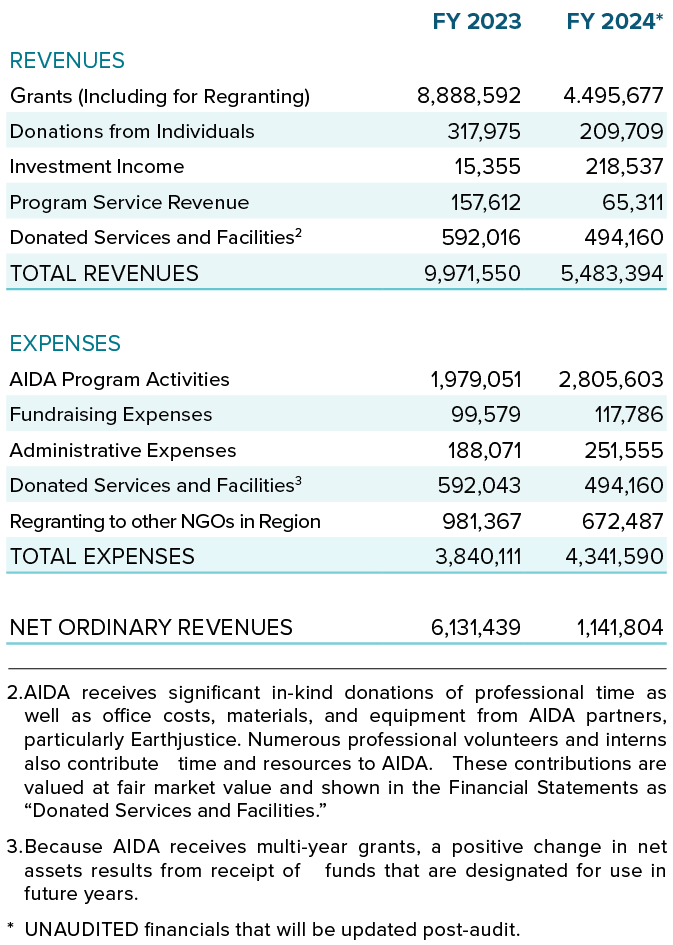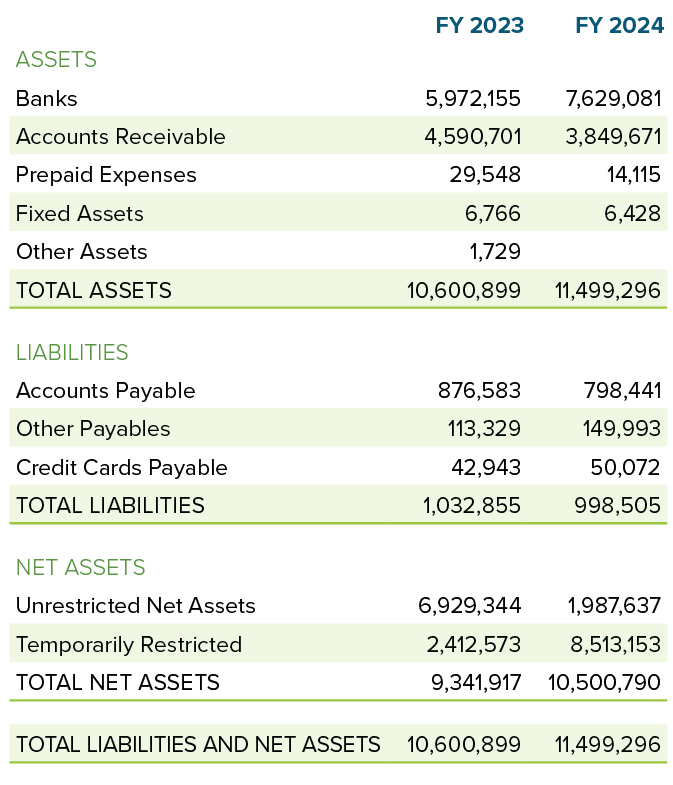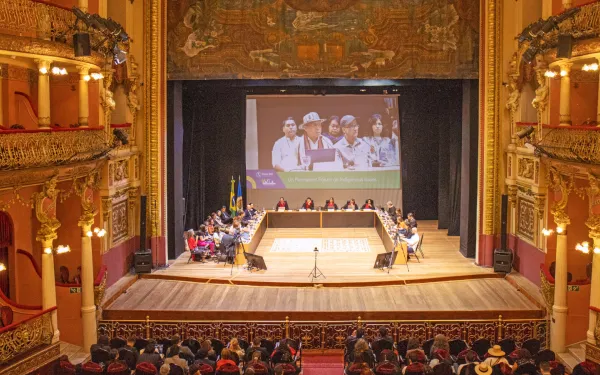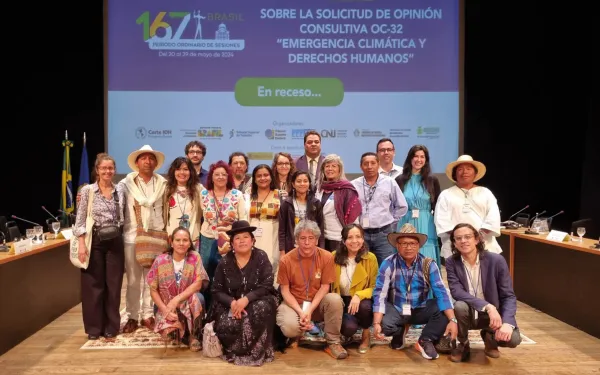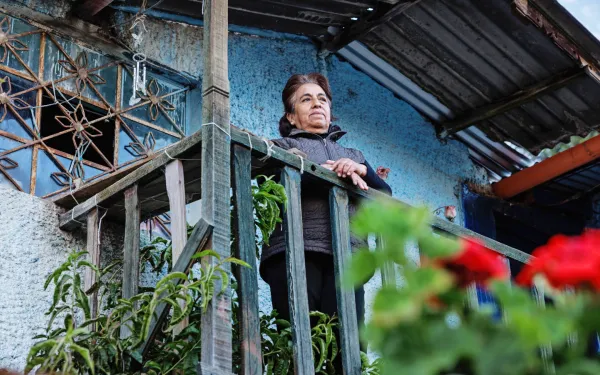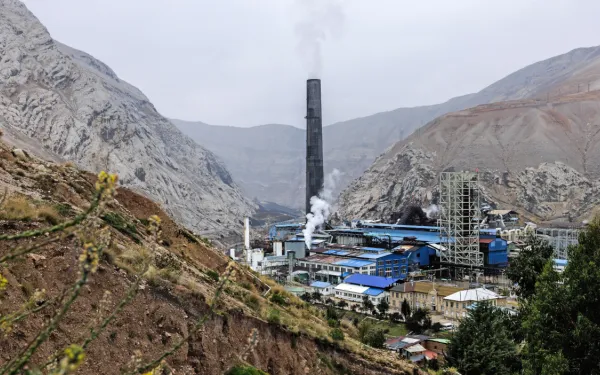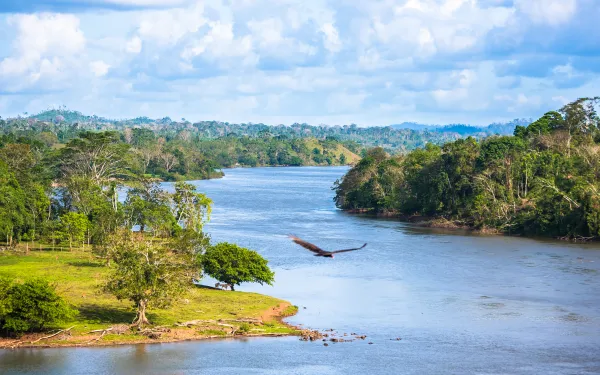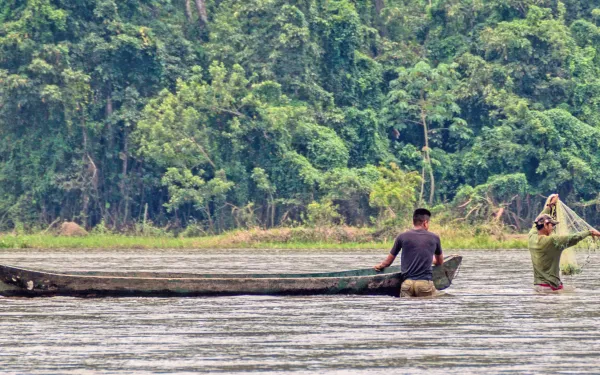Message from the Director
This has been a year of growth and maturity for AIDA.
Together with our strong multidisciplinary team, we have set important precedents to protect the right to a healthy environment in Latin America and the Caribbean.
And we did it hand-in-hand with social and community organizations across the continent.
The achievements of 2024 reflect one of our pillars as a regional organization: being a bridge between communities affected by environmental degradation and high-level decision-making spaces where they can obtain justice.
We are very grateful for your trust and support, which has driven all this work.
With your help, we will continue to promote decisions that include the voices of those who truly care for and live in balance with nature.
AIDA in Numbers
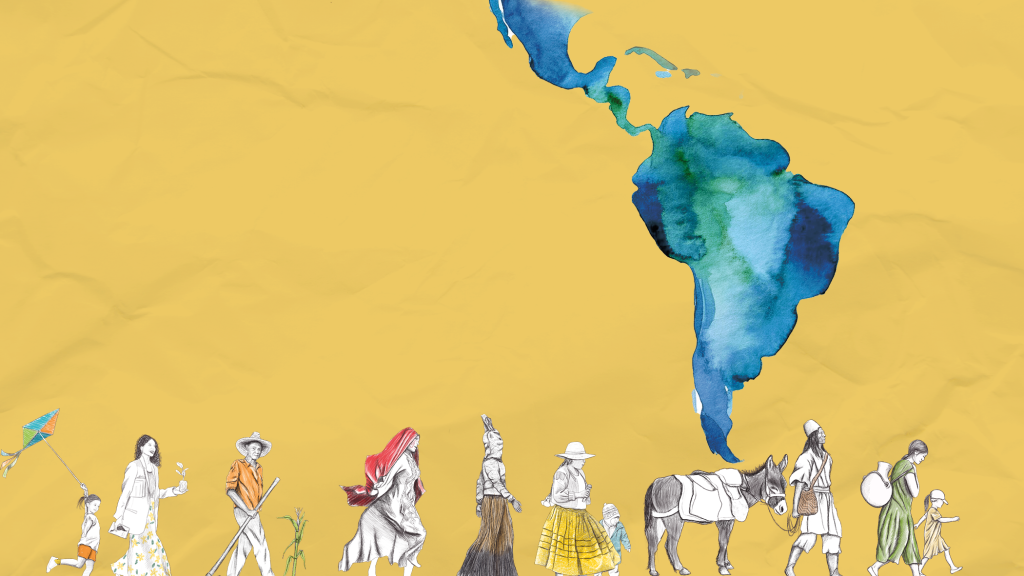
Driving climate action with local knowledge
Some 3.6 billion people around the world live in contexts that make them highly vulnerable to the impacts of the climate crisis.
They include indigenous peoples, traditional communities, women and girls.
When we learned of the judgment in which the Inter-American Court of Human Rights will clarify for the first time the obligations of governments to protect people in the face of the climate crisis, we understood the historic opportunity to include in the process those who suffer greater and more differentiated impacts.
"The knowledge of communities, both rural and urban, offers an accurate way to address the climate crisis and other global challenges," says Liliana Ávila, Director of the Human Rights and Environment Program. "It’s time to heed the call of the territories to rethink the structural causes of the current natural and spiritual imbalances."
AIDA helped communities, organizations, and civil society alliances across the continent make their voices heard through 15 amicus briefs submitted to the Court, highlighting the impact of the climate emergency on indigenous peoples, women, children, populations with diverse gender orientations and identities, and fragile ecosystems such as coral reefs.
We also submitted our own brief to the Court to demonstrate the existence of the right to a "safe and stable climate" as an overriding element of the right to a healthy environment and the obligations of government to guarantee it.
In a historic and symbolic event, community representatives supported by AIDA testified at public hearings to show how the climate crisis and environmental injustice affect their way of life and what they propose to the Court to protect their rights.
They brought wisdom, dignity, and hope.
The Court's opinion – called the Advisory Opinion on Climate Emergency and Human Rights – is expected in the first half of next year. Once issued, it will help states integrate a human rights approach into their climate policies and strengthen arguments in litigation seeking effective action by governments and corporations, as well as judges' decisions in those cases.
"Our role in this process affirms that the fight against the climate crisis will be with and for the people, or it won't be," says Avila. "It’s part of our ongoing quest to change the traditionally exclusionary logics of decision-making spaces, to promote the exchange of diverse knowledge, and to help ensure that decisions about nature include the voice of those who truly care for it and live in harmony with it."
Making history for a healthy environment in the Americas
"[This is] the strongest and most comprehensive judgement of any regional human rights court to date. Not only does it provide long overdue environmental justice for the people of La Oroya in Peru, it also establishes a vital precedent that will be used by concerned citizens, communities, courts, and environmental human rights defenders all over the world.”
With these words, on March 22, the then UN Special Rapporteur on Human Rights and the Environment, David Boyd, referred to the ruling in which the Inter-American Court held the Peruvian state responsible for violating the rights of the residents of the town of La Oroya by failing to take timely and effective action to protect them from extreme levels of pollution from a metallurgical complex.
On that day, the international court issued its response to more than 20 years of justice-seeking, ordering the state to implement comprehensive reparations.
In many ways, the verdict is the result of AIDA's history as an organization. The case, which we have been involved in and supporting since 1997, was the first to focus our efforts on guaranteeing the right to a healthy environment in Latin America.
"The ruling helps ensure the environmental quality of water and air throughout the continent," says Rosa Peña, Senior Attorney. "By establishing for the first time that industrial pollution can violate human rights, it opens a path to justice for many communities affected by this problem.
This victory began in 2006 with an international complaint that AIDA, along with a coalition of organizations, filed against the Peruvian state before the Inter-American Commission on Human Rights, which, after establishing the state's responsibility, referred the case to the Inter-American Court of Justice in 2021.
With its decision, the Court established an important precedent for government oversight of corporate activities in the areas of human rights and the environment.
Among other things, the Court established that it is sufficient to prove that exposure to pollution causes a significant health risk to establish a human rights violation; ruled that the right to a healthy environment includes the right to clean air and water; condemned, for the first time, a State for failing to ensure effective public participation in environmental decision-making that affects people in general; and recognized the differential impact of environmental pollution on individuals, groups and communities that already bear the burden of poverty, discrimination and marginalization.
Recognizing the importance of this achievement, our current efforts are aimed at ensuring the proper implementation of the judgment.
"This is a great opportunity for Peru to improve the prevention and management of the environmental impacts of mining and metallurgical activities, as well as the health care of people exposed to pollution," says Peña. "The court has shown the way, now it is up to the whole country to follow it and serve as an example at the national and international levels."
Prioritizing human rights in climate finance
Tackling the climate crisis involves structural changes that require substantial financial resources. To be effective and responsible, these funds must not result in environmental damage or harm to the people they are intended to benefit.
With this in mind, AIDA tracks the money being allocated to address the climate crisis in Latin America and the Caribbean.
"What we are doing is building bridges between the high-level spaces where funding is approved and the territories where the funded projects are to be implemented," says Florencia Ortúzar, director of the Climate Program. "In this way, we help resources reach their maximum potential for the paradigm shift we need."
Our work recently succeeded in protecting indigenous and Afro-descendant communities in Nicaragua whose rights were threatened by a forestry project for which the Green Climate Fund – the world's leading multilateral climate financier – had committed $64 million in 2020.
The proposal for the funds submitted by the Central American Bank for Economic Integration ignored the context of violence and lack of human rights protection still suffered by indigenous communities in Nicaragua, particularly in the project area. Its implementation would have led to further violence and environmental degradation.
In addition, the project was designed without adequate information disclosure, indigenous consultation, and the free, prior and informed consent of the communities.
In 2021, together with allied organizations, we supported the communities in filing a complaint with the Green Climate Fund's Independent Redress Mechanism, which launched an investigation and issued a report in March 2022 stating that the project did not comply with the Fund's policies and procedures on socio-environmental safeguards.
A year later, the fund's secretariat decided to stop funding the project. The decision, based on the investigation report, was preceded by careful advocacy work that facilitated direct contact between the affected communities and the Secretariat. This is the first time that the Fund has canceled funding where human rights violations have been proven.
"By connecting entities like the Green Climate Fund to the realities on the ground, we not only promote decisions that take into account the voices of communities, but also have an impact beyond individual cases on responsible financing for the entire region," says Ortúzar.
3 Advances for Key Ecosystems in Latin America
Supreme Court protects wetland complex in Colombia
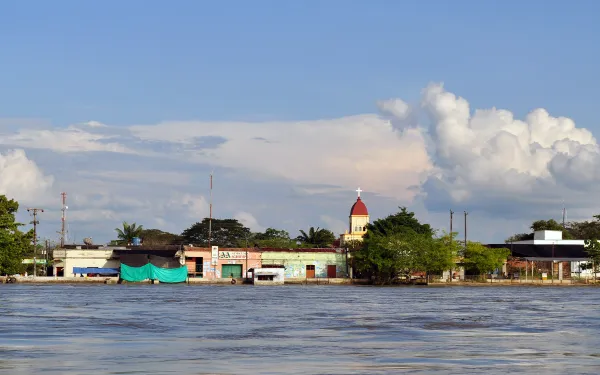
Supreme Court protects wetland complex in Colombia
In response to two lawsuits supported by AIDA, and after finding that the area was directly affected, the Colombian Constitutional Court ruled that the right to prior consultation of an Afro-descendant community in Puerto Wilches had been violated in the approval of two pilot projects to extract unconventional hydrocarbons through fracking. The ruling protected a mega-diverse region that is home to a wetland complex. It is a regional milestone that recognizes that processes related to energy transition must be fair and guarantee the rights of communities that may be affected.
Commission hears the impacts of mining for transition in biodiverse areas
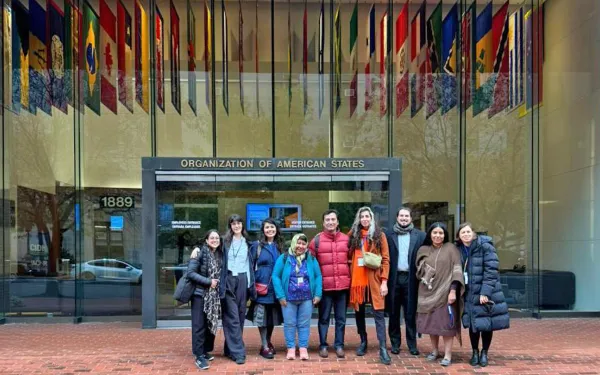
Commission hears the impacts of mining for transition in biodiverse areas
In a public hearing before the Inter-American Commission on Human Rights, together with affected communities and allied organizations, we highlighted the impacts caused by the extraction of lithium, copper and other minerals used for energy transition in highly biodiverse territories such as the Gran Atacama – a region located in the Puna region on the border of Argentina, Bolivia and Chile – and the Amazon. We requested that the Commission urge the governments of the region to adopt concrete measures to protect human rights in energy transition processes.
Civil Society Leads Efforts to Ratify the High Seas Treaty
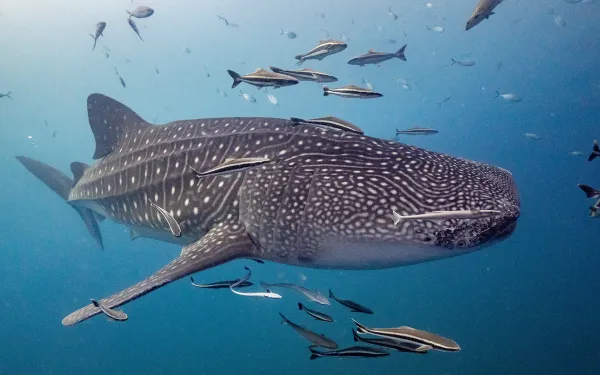
Crédito: Nick Utchin / Shutter Stock.
Civil Society Leads Efforts to Ratify the High Seas Treaty
This year, the AIDA team joined Latin American government officials and experts in a series of briefings to dispel doubts about the High Seas Treaty, highlight the importance of its ratification, and share knowledge and experiences among countries. Topics such as the equitable benefit-sharing mechanism, capacity building and the role of civil society in the implementation of the treaty were addressed with an emphasis on the realities of each country. Against this backdrop, Panama ratified the treaty in October.
Our Team
This year, our team continued to grow stronger, developing a solid and multidisciplinary body of work in favor of a healthy environment in Latin America and the Caribbean. Most of the members of AIDA, professionals from different fields specialized in the defense of the environment and human rights, were born and live in the region.
Finances

